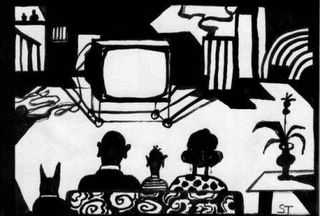I had the chance to share table with a prophet yesterday. After delivering a lecture to over 400 people at Drury University, bestselling author, Jim Wallis—sans wild hair and bullshit—ate chicken and rice with me…and about 30 others. Wallis was in town to promote his book, God’s Politics: Why the Right Gets It Wrong and the Left Doesn’t Get It, and to declare a message he has been proclaiming for over thirty years as editor of Sojourners magazine and the founder of Call to Renewal. His message was this: “The monologue of the religious Right is over. The new dialogue has begun.”
What’s so important about this guy that he is showing up on The Daily Show, Hannity & Colmes, and PBS? Why is Bono chatting with him; and why are Al Mohler, James Dobson, and Jerry Falwell debating him on talk radio and cable television? Why do the Clintons hang with him; and why do President Bush and Prime Minister Blair consult him on matters of war and poverty? And, most of all, why is Barak Obama having breakfast with this guy next Tuesday?
Perhaps because he is the most important figure in religion and politics at this particular moment in history. What about Benedict XVI and Abu Musab Zarqawi, I hear you asking? Okay, the most important religious figure in the United States. What about Dobson and Falwell? Okay, within the confines of non-theocratic, progressive, evangelical, American I-don’t-want-to-build-an-angry-empire type Christianity, this is the guy.
Why is he traveling around the country like a rock star, with auditoriums and bookstores filling to standing-room only? Because he is saying what so many lack the courage to say. And the truth he speaks to power isn’t part of the polarizing cliches we see in everyday politics and religion. Wallis isn’t claiming the end of the world or threatening liberal judges; he seeks to reclaim the faith that has been hijacked by the religious Right and neglected by the secular Left.
He challenges the Right for claiming ownership of God and setting a public agenda that rarely extends beyond abortion and gay marriage. He points out that since the Bible refers to the poor over 3,000 times, perhaps we ought to make poverty and social justice our number one concern. He asks, “Since when did having moral values make you pro-war, pro-rich, and pro-America only?”
In fact when Dobson and his minions held their Justice Sunday rally last week, where they claimed that Democrats are “against people of faith,” Wallis headed up a counter rally where he pointed that even when Martin Luther King, Jr. chastised the errant clergy his Letter from a Birmingham Jail, he challenged them, but he never questioned their faith.
Admittedly he is easier on the Left. He seems to be more in line with most liberal policies; but in reference to Democratic secularists (like Howard Dean) that are uncomfortable with religion, he says, “We need leaders who at least know that the book of Job is in the Old Testament.” Rather than abandon religion, Wallis argues that the Left should lean in to it.
What he is describing is a prophetic faith that could counter the empire-building religion of the Right. Like Cornel West, Wallis warns against the rhetoric of “Pax Americana.” And, where are the churches? Many of them are lining up to crown the emperor.
Clearly, most churches today are “non-prophet” organizations. Their agenda is set for them by leaders who don’t own Bibles, or clearly haven’t read them in a long time.
There’s more to say, but I am only halfway through the book.
I suppose what I like best about Wallis is his dual commitment to critique and dialogue. What we usually get from social changers is bitter critique followed by self-righteous monologue, or a call to cooperative dialogue that is so anemic it fails to call the power structure to task. He is not afraid to call out the Pharisees and lay some woes on their ass (see Matthew 23); but he cautions against self-righteousness or the cynicism of despair. We have to proceed with hope and commitment to real solutions.
He is not afraid to say, “James Dobson is a theocrat.” But he doesn’t just beat his chest and make SpongeBob jokes. He provides layer upon layer of real solutions for the immorality in our culture that do not include demonizing and directing our collective hate toward a group of people because of their sexual identity.
He is fond of saying, “Churches can’t just keep pulling bodies out of the river. At some point, we need to go upstream to stop whoever is throwing them in.”
Like Wallis, I’m tired of the politics of blame and fear. I’m ready for a politics of hope.
So, yesterday’s lunch was a prophetable experience for me. I don’t have much respect for those (including myself) who smugly condemn the status quo, while doing very little about it. It’s easy for us to beat on a governor for cutting Medicaid, or a president for privileging the rich; but what action are we taking?
Wallis says, “Discussion is not enough. We can’t just sit around in our comfortable homes and pontificate about the condition of the world. We need to be in relationship with the poor.”
Come on, “We are the ones we’ve been waiting for.”








